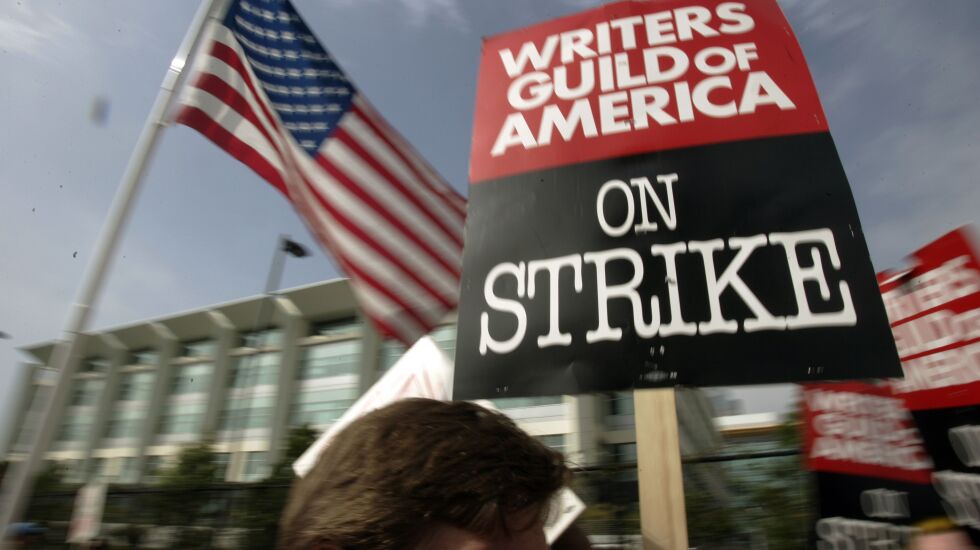
NEW YORK — Television and movie writers declared late Monday that they will launch a strike for the first time in 15 years, as Hollywood girded for a walkout with potentially widespread ramifications in a fight over fair pay in the streaming era.
The Writers Guild of America said that its 11,500 unionized screenwriters will head to the picket lines on Tuesday. Negotiations between studios and the writers, which began in March, failed to reach a new contract before the writers’ current deal expired just after midnight, at 12:01 a.m. PDT Tuesday. All script writing is to immediately cease, the guild informed its members.
The board of directors for the WGA, which includes both a West and an East branch, voted unanimously to call for a strike, effective at the stroke of midnight. Writers, they said, are facing an “existential crisis.”
“The companies’ behavior has created a gig economy inside a union workforce, and their immovable stance in this negotiation has betrayed a commitment to further devaluing the profession of writing,” the WGA said in a statement. “From their refusal to guarantee any level of weekly employment in episodic television, to the creation of a ‘day rate’ in comedy variety, to their stonewalling on free work for screenwriters and on AI for all writers, they have closed the door on their labor force and opened the door to writing as an entirely freelance profession. No such deal could ever be contemplated by this membership.”
The Alliance of Motion Picture and Television Producers, the trade association that bargains on behalf of studios and production companies, signaled late Monday that negotiations fell short of an agreement before the current contract expired. The alliance said it presented an offer with “generous increases in compensation for writers as well as improvements in streaming residuals.”
In a statement, the alliance said that it was prepared to improve its offer “but was unwilling to do so because of the magnitude of other proposals still on the table that the guild continues to insist upon.”
The labor dispute could have a cascading effect on TV and film productions depending on how long the strike persists. But a shutdown has been widely forecast for months due to the scope of the discord. The writers last month voted overwhelming to authorize a strike, with 98% of membership in support.
At issue is how writers are compensated in an industry where streaming has changed the rules of Hollywood economics. Writers say they aren’t being paid enough, TV writer rooms have shrunk too much and the old calculus for how residuals are paid out needs to be redrawn.
“The survival of our profession is at stake,” the guild has said.
“Pencils down,” said “Halt and Catch Fire” showrunner and co-creator Christopher Cantwell on Twitter.
Pencils down. Don’t even type in the document. https://t.co/4fRkbkXnhr
— Christopher Cantwell (@ifyoucantwell) May 2, 2023
Streaming has exploded the number of series and films that are made each year, meaning more jobs for writers. But WGA members say they’re making much less money and working under more strained conditions. Showrunners on streaming series receive just 46% of the pay that showrunners on broadcast series receive, the WGA claims. Content is booming, but pay is down.
The guild is seeking more compensation on the front-end of deals. Many of the back-end payments writers have historically profited by — like syndication and international licensing — have been largely phased out by the onset of streaming. More writers — roughly half — are being paid minimum rates, an increase of 16% over the last decade. The use of so-called mini-writers rooms has soared.
The Alliance of Motion Picture and Television Producers said Monday that the primary sticking points to a deal revolved around those mini-rooms — the guild is seeking a minimum number of scribes per writer room — and duration of employment restrictions. The guild has said more flexibility for writers is needed when they’re contracted for series that have tended to be more limited and short-lived than the once-standard 20-plus episode broadcast season.
At the same time, studios are under increased pressure from Wall Street to turn a profit with their streaming services. Many studios and production companies are slashing spending. The Walt Disney Co. is eliminating 7,000 jobs. Warner Bros. Discovery is cutting costs to lessen its debt. Netflix has pumped the brakes on spending growth.
When Hollywood writers have gone on strike, it’s often been lengthy. In 1988, a WGA strike lasted 153 days. The last WGA strike went for 100 days, beginning in 2007 and ending in 2008.
The most immediate effect of the strike viewers are likely to notice will be on late-night shows and “Saturday Night Live.” All are expected to immediately go dark. During the 2007 strike, late-night hosts eventually returned to the air and improvised material. Jay Leno wrote his own monologues, a move that angered union leadership.
On Friday’s episode of “Late Night,” Seth Meyers, a WGA member who said he supported the union’s demands, prepared viewers for re-runs while lamenting the hardship a strike entails.
“It doesn’t just affect the writers, it affects all the incredible non-writing staff on these shows,” Meyers said. “And it would really be a miserable thing for people to have to go through, especially considering we’re on the heels of that awful pandemic that affected, not just show business, but all of us.”
Scripted series and films will take longer to be affected. But if a strike persisted through the summer, fall schedules could be upended. And in the meantime, not having writers available for rewrites can have a dramatic effect on quality. The James Bond film “Quantum of Solace” was one of many films rushed into production during the 2007-2008 strike with what Daniel Craig called “the bare bones of a script.”







